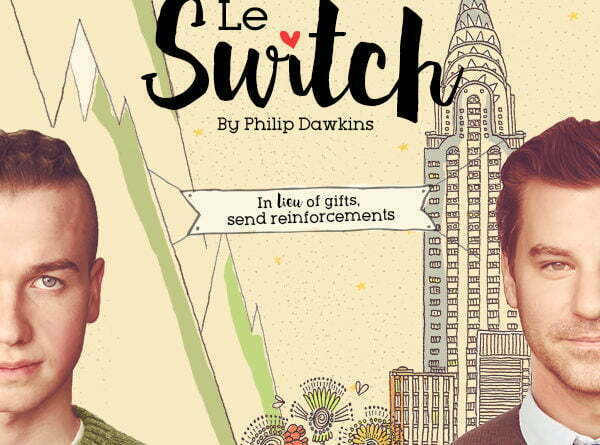Le Switch
By Philip Dawkins
Directed by Stephen Brackett
Produced by About Face Theatre, Chicago
Presented by Special Arrangement with Doug Nevin
LGBT Americans Ready for Romantic Comedies
With the expansion of marriage rights to include gay couples, and youth opinion overwhelmingly in favor of full equality, it is now possible to envision an America in which gay people are no longer “queer.” One of the signs of growing acceptance could be the use of gay protagonists in otherwise unremarkable romantic comedies. Indeed, “romantic comedy” is the phrase About Face Theatre uses to describe Philip Dawkins’s latest play, Le Switch, in contrast to Charm, which played last year at Steppenwolf’s garage in a production by Northlight, or his other recent works. I’m not a fan of the genre, and don’t think Dawkins did anything particularly fresh with it, but the night I attended, the house was at full capacity, so clearly, there is a demand for light-hearted gay material.
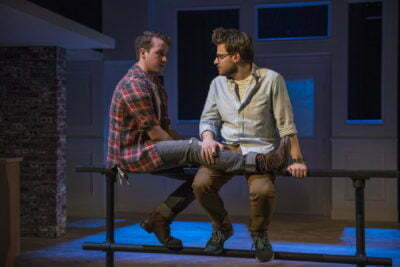
The play begins in 2011, shortly after marriage equality was legalized in New York. David Fienberg (Stephen Cone) is a professor of library-sciences in his mid-thirties who uses a radical leftist anti-marriage/monogamy/long-term relationship ideology as a thin cover for his lack of social skills and other personal deficiencies. He has a twin sister, Sarah (Elizabeth Ledo), who has likewise rejected conventional marriage out of fear of repeating her parents’ tumultuous relationship, except she has the self-awareness to know that this is more of a personal choice than a revolutionary statement. David, his sassy black friend, Zachary, (La Shawn Banks), and his sassy old friend, Frank (Mitchell J. Fain) had been used to living without the option of getting married, but now that equality has arrived to New York, Zachary is tying the knot with his partner. David is confounded that Zachary would actually want the thing they have been demanding for years, and he lets slip that he doesn’t consider Zachary’s wedding to be “real,” but he agrees to accompany him to a bachelor party in Montreal. Although, really, for the grooms to hold a joint bachelor party defeats the purpose.
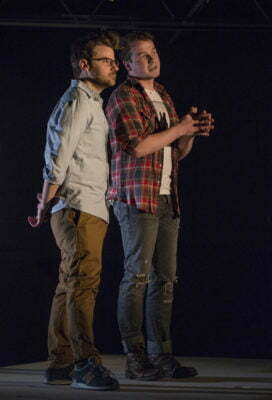 Once in Montreal, David has a meet-cute with Benoît (Collin Quinn Rice), a twenty-three year old florist and Luddite, who is smitten with him. They enjoy their time together, and David is mystified by the lack of tragedy in Benoît’s life. If attempted suicide is no longer a rite of passage for young gay men, then David no longer recognizes the world, and that makes him uncomfortable. Three years later, the US Supreme Court’s refusal to hear appeals from three federal circuits where bans on same-sex marriage have been struck down signals their intention to legalize it nation-wide, and David and Benoît have settled into a stable long-term relationship (albeit one made difficult by Benoît’s refusal to own a phone). Zachary and his husband find that they are seeing too much of each other, while Sarah has fallen in love with the man she married to help him obtain a green card. Frank wisely observes that relationships take work. Without marriage or the opportunity for it, there was less pressure on people to remain committed, but that made commitment more meaningful. After David callously brushes off a proposal from Benoît, it comes time for him to finally learn the moral of the story and fix things.
Once in Montreal, David has a meet-cute with Benoît (Collin Quinn Rice), a twenty-three year old florist and Luddite, who is smitten with him. They enjoy their time together, and David is mystified by the lack of tragedy in Benoît’s life. If attempted suicide is no longer a rite of passage for young gay men, then David no longer recognizes the world, and that makes him uncomfortable. Three years later, the US Supreme Court’s refusal to hear appeals from three federal circuits where bans on same-sex marriage have been struck down signals their intention to legalize it nation-wide, and David and Benoît have settled into a stable long-term relationship (albeit one made difficult by Benoît’s refusal to own a phone). Zachary and his husband find that they are seeing too much of each other, while Sarah has fallen in love with the man she married to help him obtain a green card. Frank wisely observes that relationships take work. Without marriage or the opportunity for it, there was less pressure on people to remain committed, but that made commitment more meaningful. After David callously brushes off a proposal from Benoît, it comes time for him to finally learn the moral of the story and fix things.
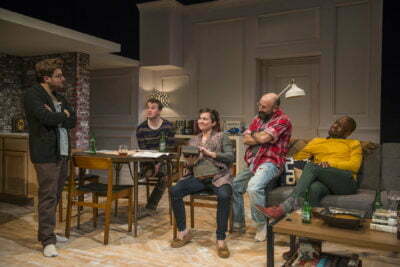
The actors here are all fine, and Ledo and Rice are even quite good. Ledo’s character has a sub-plot involving her working as the authority on continuity for a sci-fi franchise, which she regards as the most pointless, ridiculous job imaginable. But as her marriage turns into love, she begins to take the themes her job requires her to think about more seriously. It provides Ledo’s character with problems and resolutions that have nothing to do with her brother, which is probably why she seems so much more compelling. Despite her constant reassurances that he deserves love and happiness, we see very little reason to like David. He’s a self-absorbed cynical know-it-all who has little regard for anybody else, and doesn’t seem to enjoy anything except inventing classifications for people and collecting unopened antique books. I thought that Benoît could remain alone and still be doing better for himself.
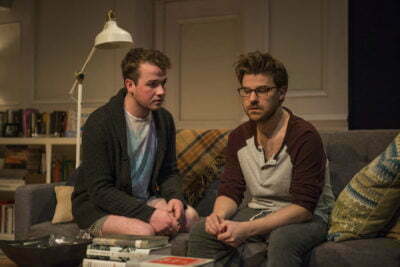 Banks and Fain are stuck with stock characters, but give enthusiastic performances anyway. Set designer Joe Schermoly wrestles with a script that’s many changes in location would have worked better if it was for a TV movie. He elected to create a naturalistic design for a Frank and David’s apartment, and allow all the other scenes (including several poetic descriptions of Montreal’s skyline) to occur in the dark or without reference to the props and background. Director Stephen Brackett winds up having every scene outside the apartment take place in tiny little corners. I recognize that this play has generated some interest, and that gay people may enjoy having come far enough to be subjects of a romantic comedy instead of high tragedy (this play’s themes are like a lighter take on Mothers and Sons, now at Northlight). But I still maintain that if I’m hoping that the main relationship fails, something’s wrong in the writing.
Banks and Fain are stuck with stock characters, but give enthusiastic performances anyway. Set designer Joe Schermoly wrestles with a script that’s many changes in location would have worked better if it was for a TV movie. He elected to create a naturalistic design for a Frank and David’s apartment, and allow all the other scenes (including several poetic descriptions of Montreal’s skyline) to occur in the dark or without reference to the props and background. Director Stephen Brackett winds up having every scene outside the apartment take place in tiny little corners. I recognize that this play has generated some interest, and that gay people may enjoy having come far enough to be subjects of a romantic comedy instead of high tragedy (this play’s themes are like a lighter take on Mothers and Sons, now at Northlight). But I still maintain that if I’m hoping that the main relationship fails, something’s wrong in the writing.
Somewhat Recommended
Jacob Davis
[email protected]
Reviewed January 30, 2016
This show has been Jeff recommended.
For more information, see Le Switch’s page on Theatre in Chicago.
Playing at Theater Wit, 1229 W Belmont Ave, Chicago. Tickets are $35, with discounts for students, seniors, and groups. To order, call 773-404-7336 or visit aboutfacetheatre.org. Performances are Wednesdays-Saturdays at 7:30 pm and Sundays at 3:00 pm through February 21. Running time is two hours and fifteen minutes, with one intermission.

